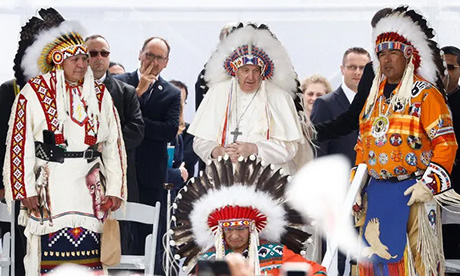Pope Francis’ first act on his Canadian “penitential pilgrimage,” July 25, was the return of two pair of children’s moccasins.
The shoes were not part of the Vatican Museums artefacts but were given to him when Canadian Indigenous visited Rome in March 2022
“The first step of my penitential pilgrimage among you is that of again asking forgiveness, of telling you once more that I am deeply sorry,” the Pope said.
“I am sorry,” he said.
“I ask forgiveness, in particular, for the ways in which many members of the church and of religious communities cooperated, not least through their indifference, in projects of cultural destruction and forced assimilation promoted by the governments of that time, which culminated in the system of residential schools.”
Francis was greeted by Cree Chief Wilton Littlechild, who, on behalf of the First Nations, Métis and Inuit communities, expressed deep appreciation for “the great personal effort” he has made to meet Indigenous peoples in their homeland.
In his address Usow-Kihew (“Golden Eagle”,) as he is known in his Cree community, warmly welcomed Pope Francis’ joining the Indigenous peoples of Canada in their journey of healing and reconciliation and said the words he spoke after meeting the Indigenous delegations in Rome and listening to their stories, were “a source of deep comfort and great encouragement”.
Francis said he is visiting their native lands to tell them in person of his sorrow and to implore God’s forgiveness.
“We want to walk together, to pray together and to work together so that the sufferings of the past can lead to a future of justice, healing and reconciliation,” said Francis.
“I am here because the first step of my penitential pilgrimage among you is that of again asking forgiveness, of telling you once more that I am deeply sorry,” he said.
Francis apologised “for the ways in which, regrettably, many Christians supported the colonizing mentality of the powers that oppressed the Indigenous peoples.”
Saying the Church’s actions were “catastrophic,” Francis called the indigenous culture “a treasury of sound customs and teachings, centred on concern for others, truthfulness, courage and respect, humility, honesty, and practical wisdom.”
Christian faith, he said, “tells us that this was a disastrous error, incompatible with the Gospel of Jesus Christ.”
He said it is painful for him to think of how the values, language, and culture of Indigenous communities “was eroded, and that you have continued to pay the price of this.”
The Canadian government now estimates at least 150,000 First Nation, Inuit and Métis children were taken from their families and communities and forced to attend the schools between 1870 and 1997.
At least 4,120 children died at the schools, and several thousand others vanished without a trace.
As the meeting with the pope began, dozens of people carried a long red banner through the crowd. The banner bore the names of each of the 4,120 deceased children and the school where they died.
Students at the schools were forbidden to speak their native languages or practice their traditions. The government provided so little financing that the students often were malnourished. And many were emotionally, physically or even sexually abused.
